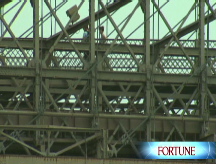Lame-duck Congress: Economy in play
Lawmakers might convene after the election to take up the economy. But the fate of any stimulus effort is uncertain.
NEW YORK (CNNMoney.com) -- There's a lot of talk in Washington about Congress convening a special post-election session to take up bills to stimulate the faltering economy.
But don't go out and spend your rebate check just yet.
Direct rebate checks like the ones distributed earlier this year seem to be off the table in any lame-duck session. Democrats are pushing for an increase in the amount of time people can collect unemployment checks and more spending on infrastructure projects.
Republican ideas include doubling the child tax credit and temporarily scrapping the capital gains tax.
But it's also questionable whether a bill can even be passed, let alone get signed by President Bush. A lot hinges on the outcome of Tuesday's election.
"If (Republican John) McCain wins, I think we'll definitely get a stimulus in the lame duck," said Anne Mathias, policy director of research for the Stanford Group, a policy research firm.
If Democrat Barack Obama wins, Mathias put the odds at 50% or less that Congress will pass a bill.
"A bill the Democrats want isn't something President Bush would sign," she said. "They would rather send it to a President Obama."
For the Democrats, who currently control Congress and are widely expected to pick up even more seats following the elections, the motivation for passing a stimulus package now is that the economy may need it sooner rather than later.
The last stimulus package, passed early this year, sent about $100 billion in rebates to tax filers. It was designed to give the economy a quick, consumer spending-induced jolt until long-term plans, such as interest rate cuts, could take effect.
Most analysts say it did provide a modest boost to the economy in the second quarter, although more people actually saved the money than spent it.
That's partly why the focus this time around is on infrastructure or tax cuts, so that the impact is more direct.
But outside experts say a second stimulus package does not need to be passed right away.
"There's not a lot the government can do in the short term," said Jason Trennert, a partner at Strategas, a research firm that serves institutional investors. "The United States is a $14 trillion economy, and once it gets moving in one direction, it's hard to stop it."
Publicly, the Democrats say they want something done now.
"If we can pass something in the short term that benefits the economy, we'll do that," said Stacey Bernards, a spokeswoman for House Majority Leader Steny Hoyer, D-Md. "Hopefully, we can address it before the new year."
But given the most recent polling numbers showing Obama has the lead in the polls, the Democrats may not be prepared to do much bargaining.
"There will be an attempt to try and move a stimulus package," said one Senate Democrat staffer. "But if (the Republicans) are going to try and block everything, we'll just pack up and try again in January."
A deal with congressional Republicans may be doable.
Mike Steel, an aide to House Minority Leader John Boehner, R-Ohio, said the Republicans would prefer to pass a stimulus bill that didn't include extensions in unemployment benefits, food stamps and infrastructure projects, arguing they take too long to effectively boost the economy.
But Steel still thinks there's "a good chance something will pass in the House."
Getting President Bush to sign a new stimulus is a different story. So far the White House does not seem particularly open to the idea, especially the ones proposed by the Democrats.
"The economic benefit over the next three quarters would be something just north of zero," said White House Spokesman Tony Fratto. "If they are trying to sell that as stimulus, it just isn't."
Fratto said many things that may prop up the economy have already happened - such as lower interest rates, a rescue plan to get banks lending again, and falling oil prices.
As to whether the economy needs a second stimulus, he said "that's not clear yet."
That's a position shared by Mathias, the policy researcher, and could be the strongest evidence the economy won't see a second stimulus until at least the start of the new year.
"The view is we need to think about this a little longer," said Mathias. "We just dosed up the patient with 20 different kinds of medicine. Let's wait and see what happens." ![]()


